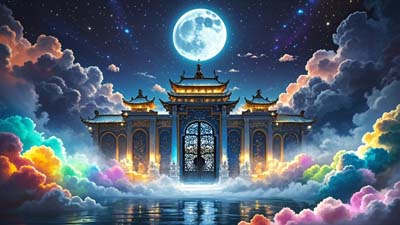
by 李商隐 (Lĭ Shāngyĭn) Li Shangyin
Yúnmŭ píngfēng zhúyĭng shēn, chánghé jiàn luò xiăoxīng chén.
云母 屏风 烛影 深, 长河 渐 落 晓星 沉。
Now that a candle-shadow stands on the screen of carven marble,and the River of Heaven slants and the morning stars are low。
Cháng É yīng huĭ tōu língyào, bìhăi qīngtiān yè yè xīn.
嫦 娥 应 悔 偷 灵药,碧海 青天 夜 夜 心。
Are you sorry for having stolen the potion that has set you, over jade seas and blue skies, to brood through the long nights?
1. 嫦娥(Cháng É):n. the fairy in the moon
2. 屏风(píngfēng):n. the screen in the room to separate the space
3. 长河(chánghé):n. the galaxy
4. 拨(bō):v. to push aside
5. 晓星(xiăoxīng):n. stars at dawn
This poem originated from the Mid-Autumn Festival by Li Shangyin, a famous poet in Tang Dynasty. 嫦娥(Cháng É), the fairy in the moon, is the main character. She had a happy family before she became a fairy, but after she stole the potion and became the moon goddess, she was separated from her husband and became lonely, and so regretted what she had done.
◆ “鹊桥仙” (Què qiáo xiān)- A Love Poem about Qi Xi
◆ 春晓 (Chūn xiăo) A Spring Morning
Chinese Culture
General Chinese (Beginner Level)
General Chinese (Intermediate Level)



